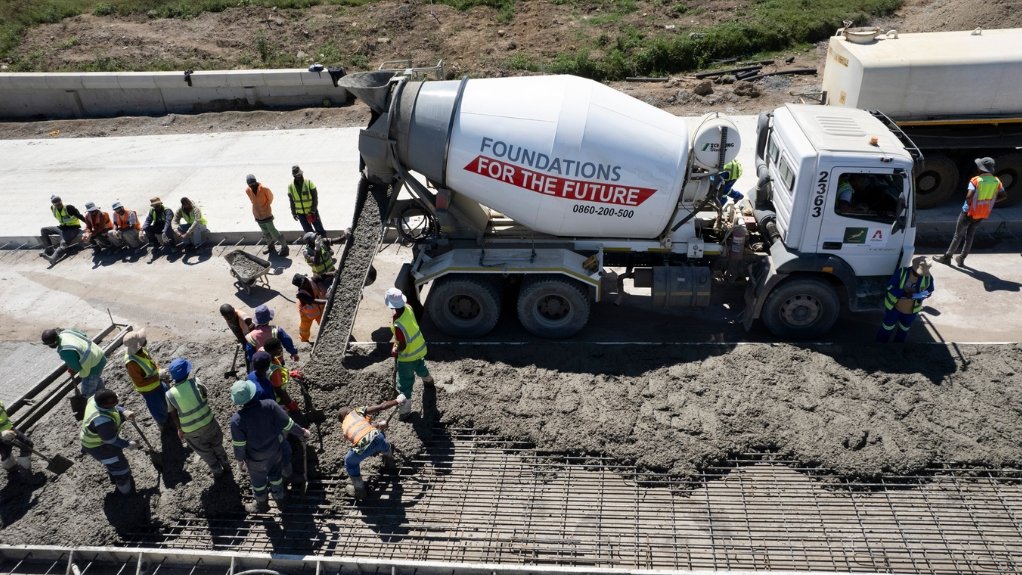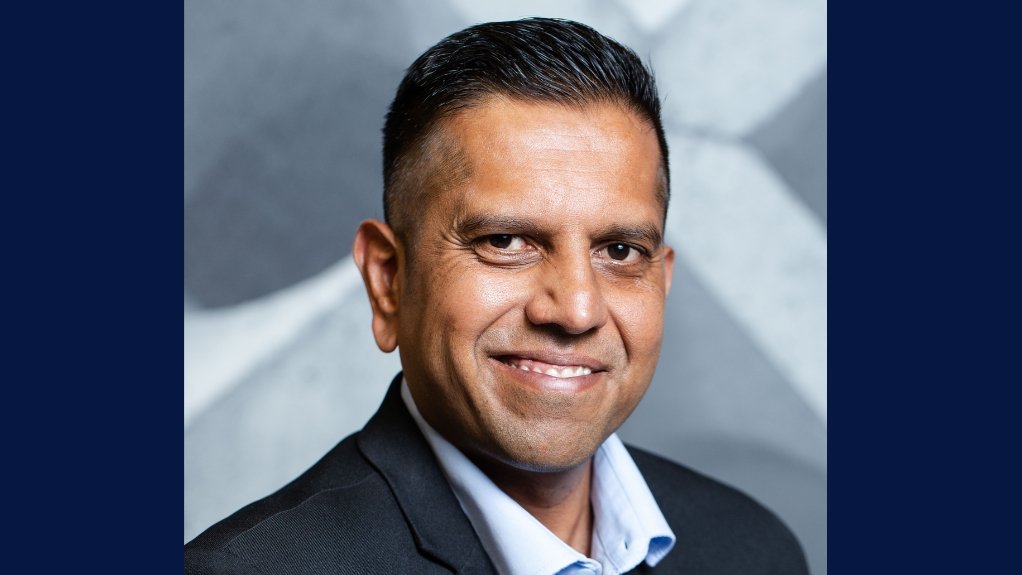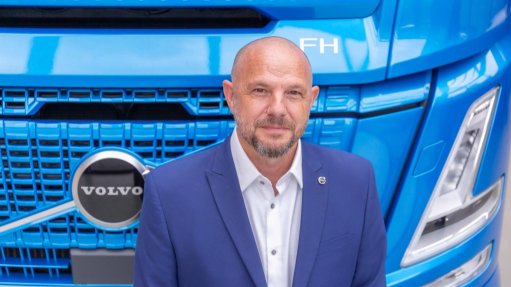Flexibility, early engagement required to deliver megaprojects



STRATEGICALLY LOCATED AfriSam has a strategic footprint of aggregate, readymix and cement plants to ensure service continuity for megaprojects
AMIT DAWNEERANGEN With activity in the construction industry significantly decreasing over the past ten years, the country has also experienced a loss of critical professional skills
Adaptable production capacity and effective communication and collaboration with contractors are vital to navigate the labour and material supply issues that could challenge the completion of megaprojects in South Africa.
“With activity in the construction industry significantly decreasing over the past ten years, the country has also experienced a loss of critical professional skills. Many engineers, contractors, concrete technologists and even foremen are leaving South Africa, emigrating to other countries for better work prospects. This has created quite a big skills gap locally,” says construction materials supplier AfriSam construction materials executive of sales and product technical Amit Dawneerangen.
Consequently, there are not enough mentors to help young graduates with the practical application of their university qualifications, especially on construction sites. This poses a problem when planning and executing megaprojects when they emerge.
Further, the oversupply of construction materials, owing to the lack of project activity and the resultant reduced demand has caused most construction materials producers, including AfriSam, to mothball plants to avoid incurring unnecessary costs.
For example, South Africa has the capacity to produce about 20-million tons of cement, but there is only currently demand for about 12-million tons. Dawneerangen highlights, however, that material suppliers can restart their operations should a project be earmarked for development in proximity to a mothballed plant. For example, when the South African National Road Agency launched tenders for N3 freeway upgrade projects between Cato Ridge and Lynnfield Park, in KwaZulu-Natal in 2021, AfriSam’s Umlaas Road quarry and readymix plant, mothballed after Covid-19, was restarted. “It is still operating to this day”, having supplied large volumes of aggregates and concrete products, says Dawneerangen.
AfriSam can meet new demand at relatively short notice. But Dawneerangen stresses the need to provide adequate lead time to enable the relevant parts of the supply chain to activate. Cement factories, quarries or readymix plants, he says, need time to prepare.
“It mostly comes down to effective communication between the project team and the various parts of the supply chain.”
However, contractors often request prices for a specific project without providing the necessary details to material suppliers. To provide an accurate and competitive price, precise information is needed at the tender stage.
“Contractors may have certain expectations about the volume of material they need to be supplied over a certain period. But our production requirements might not quite match this expectation, requiring us to introduce additional capacity. If we are unaware of this requirement, this could result in us under quoting on the material cost and having to adjust pricing during the construction stage after the tender has already been awarded,” explains Dawneerangen.
With the decline in local construction activity, many of the businesses that transported construction materials products have closed, creating a shortage of delivery vehicles.
As AfriSam does not have its own trucks, it works closely with contractors from surrounding communities, engaging them early on to ensure that the needs of a particular project can be adequately serviced.
“We contract community members to deliver product to sites for the duration of a project if their vehicles are found to be suitable and meet our standards,” he explains.
Moreover, public-sector projects require that emerging contractors from the area of construction be used to deliver 30% of the contract value to foster community upliftment.
However, many emerging contractors do not necessarily have the correct skills or experience with using certain materials supplied by AfriSam. Therefore, the company assists contractors by providing technical training on the testing of aggregates and concrete, as well as correct product applications.
“As part of our mining rights, we also comply with the Department of Mineral Resources and Energy requirement for social and labour plans geared toward community upliftment.”
Strategic Capacity
To ensure it can meet the demands of megaprojects without compromising service to its existing customers, AfriSam has a strategic footprint of readymix plants, quarries, cement operations and depots located across the country.
When a plant or quarry has been unable to keep up with demand, the company has supplemented supply from its next-closest operation or deployed mobile crushing and concrete batching plants at short notice.
“We also have a state-of-the-art vehicle tracking system that improves logistics by monitoring the turnaround times of trucks to ensure efficient deliveries that reduce costly diesel consumption and carbon emissions. This further helps to prioritise certain projects without impacting on the usual deliveries that we have scheduled,” Dawneerangen notes.
Effective planning and logistics played a critical role in ensuring the timely delivery of concrete for the Spring Grove roller compacted concrete dam project, in KwaZulu-Natal. The company had to establish two concrete batching plants on site as certain parts of the project required the continuous supply of concrete for a certain period of the project.
This project, says Dawneerangen, is a prime example of the benefits of early engagement with the contractor, which sought AfriSam’s input before submitting its bid.
Another project that required a similar 24-hour supply was the PwC building in Waterfall City, in Midrand, Gauteng, for which AfriSam supplied 20 000 m3 of concrete.
“This was a technical project as it required the supply of about 19 different mix designs. Therefore, the coordination and collaboration between us, the engineer and the contractor needed to be effective, otherwise the successful completion of the project could have been compromised,” elaborates Dawneerangen.
Sustainability Drivers
Besides supporting the on-time delivery of megaprojects, AfriSam also enables sustainable development.
Dawneerangen stresses that the company works closely with contractors to ensure the correct quantities of concrete are being ordered to limit returns. Not only does this prevent the need to recycle unused concrete but it also reduces wasteful expenditure.
This initiative complements the company’s more than 20 years of water recycling at its readymix plants.
“This is in addition to using supplementary cementitious materials, such as slag and fly ash in our concrete. There is roughly 1 t of CO2 emitted for every 1 t of cement produced.”
Article Enquiry
Email Article
Save Article
Feedback
To advertise email advertising@creamermedia.co.za or click here
Press Office
Announcements
What's On
Subscribe to improve your user experience...
Option 1 (equivalent of R125 a month):
Receive a weekly copy of Creamer Media's Engineering News & Mining Weekly magazine
(print copy for those in South Africa and e-magazine for those outside of South Africa)
Receive daily email newsletters
Access to full search results
Access archive of magazine back copies
Access to Projects in Progress
Access to ONE Research Report of your choice in PDF format
Option 2 (equivalent of R375 a month):
All benefits from Option 1
PLUS
Access to Creamer Media's Research Channel Africa for ALL Research Reports, in PDF format, on various industrial and mining sectors
including Electricity; Water; Energy Transition; Hydrogen; Roads, Rail and Ports; Coal; Gold; Platinum; Battery Metals; etc.
Already a subscriber?
Forgotten your password?
Receive weekly copy of Creamer Media's Engineering News & Mining Weekly magazine (print copy for those in South Africa and e-magazine for those outside of South Africa)
➕
Recieve daily email newsletters
➕
Access to full search results
➕
Access archive of magazine back copies
➕
Access to Projects in Progress
➕
Access to ONE Research Report of your choice in PDF format
RESEARCH CHANNEL AFRICA
R4500 (equivalent of R375 a month)
SUBSCRIBEAll benefits from Option 1
➕
Access to Creamer Media's Research Channel Africa for ALL Research Reports on various industrial and mining sectors, in PDF format, including on:
Electricity
➕
Water
➕
Energy Transition
➕
Hydrogen
➕
Roads, Rail and Ports
➕
Coal
➕
Gold
➕
Platinum
➕
Battery Metals
➕
etc.
Receive all benefits from Option 1 or Option 2 delivered to numerous people at your company
➕
Multiple User names and Passwords for simultaneous log-ins
➕
Intranet integration access to all in your organisation


















